Ellen and Jim Have a Blog, Too
We are two part-time academics. Ellen teaches in the English department and Jim in the IT program at George Mason University.


Pallisers 5:9: Life an artificial hardball tragic game; Raven's vision combines with Trollope's (3) · 12 March 08
Dear Harriet,
And now for my third letter on this part: a summary of the episodes for Part 9 of the 1974 BBC Palliser films, with commentary. This time I will include transcriptions of a few striking dialogues.
The intensities and originality of the language patterns and the complex themes of 5:9 are presented through mostly new invented brilliantly dramatic and effective scenes. Hardly a scene from Trollope’s novel appears; speaking generally, about 3/4s of this part is made of wholly original or semi-original scene, by which I mean a new scene entirely which uses language from one of Trollope’s. What was in Trollope’s text as a scene is often dropped, and bits of the scenes (words, gestures, dialogues) are distributed in the new scenes.
Raven and the film-making team have genuinely adapted Trollope’s material to make an effective filmic theatre and to alter the themes to a vision that is much more pessimistic Trollope presents people as accepting and falling into being dominated and as genuinely in communication with one another; he has religious and ethical (even if relativistic) beliefs which he places his characters inside. In Simon Raven’s fiction, his characters remain performers: they emotionally keep their distance from one another, and a continual feel of semi-alienation emerges as if life really is a game with no meaning beyond tomorrow’s satisfaction placed against today’s loss. Betrayal is ever the next move the person next to you performs, and the artificiality & fragility of clique systems and thus life itself comes out strongly in novels like Fielding Gray and The Rich Pay Late. Raven is one of those screenplay writers whose work improves when he combines himself with another author; he is sometimes accused of coldness, and his characters are said to be ever resilient and adaptable; combining this with Trollope’s sense of the need of people for emotional love and tendency to dwell on emotional and other outcasts produces brilliant TV drama.
Volume 5, Part 9, Episode 1: “Finn and Violet.” Scene 1) The high hill of Loughlinter, on the folly terrace: Phineas’ (Donal McCann) aggressive pursuit of Violet (Mel Martin); she wants to talk of Chiltern (John Hallam); Phineas physically crowds her, chases her through the tower, and when they are below pushes her against the wall and kisses her.
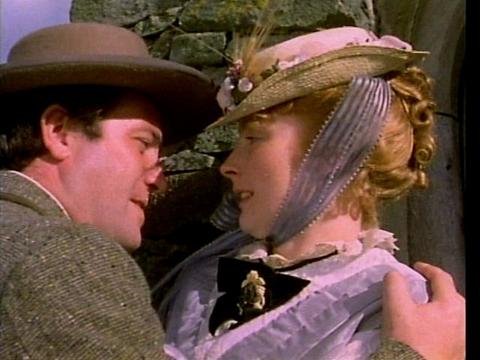
Violet Effingham (Mel Martin) and Phineas (Donal McCann)
Finn: “Are you warm enough now?”
Violet: “Hungry after all that exercise?”
Some real obtuse elements in Kennedy’s character also brought out: he will not allow Lady Laura to discuss her brother who Lady Laura loves; he will not permit her to feel her real feelings.
Scene 2) Loughlinter, inside the house. Barrington Erle (Moray Watson), reading a book, Lady Glencora (Susan Hampshire), now very pregnant again & sewing, and Plantagenet Palliser (Philip Latham) wiling the afternoon away:
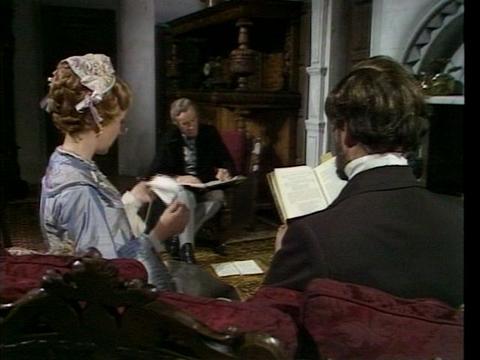
A long afternoon: Plantagenet (Philip Latham) & Lady Glencora (Susan Hampshire) Palliser and Barrington Erle (Moray Watson)
Lady Glen and Barrington go over to window, glimpse Violet and Finn returning, and discuss how the two appear to be “wary” lovers, Lady Laura’s (Anna Massey) obvious affection for Finn and growing estrangement from Kennedy (Derek Godfrey); they joke and laugh, offering an amused perspective on events we’ve seen and to come. Lady Glen and Erle reinforce the depiction of Finn in this episode as a predatory sexy male, and Mr Kennedy as controlling, greedy, utterly self-centered one. Like Chiltern, Erle wishes Finn had not rescued Kennedy from the garrotters; Lady Glen wonders if Phineas hired them; Plantagenet who would not approve is immersed in his papers, & emerges only to leave and ask that Finn be asked if he will play a game of chess; a lively exchange over Finn as a fiery Irishman (this is probably a prejudiced stereotype), whom Lady Glen approves of, for without “blazing indignation” and energy how push reform along. She says “You’re much too smug” and goes on
Lady Glen: “If I were a liberal, I’d vote for Mr Turnbull in a moment [like bilko?]
Erle. “God forbid!”
Lady Glen: “God forbid what?”
Erle. “Well, with respect, Lady Glen, you’re being a liberal member—we have enough trouble already without lady members in the house.”
Lady Glen: “We’ll get there one day, Barrington. Just you see and then you’ll see the sparks fly.”
A sparkling moment intended to connect to the audience; part of films’ upbeat heritage history. Scene 3) Madame Max’s (Barbara Murray) apartment in London: the Duke (Roland Culver) begins his attempt to proposition her. She has not asked him for anything but his company (countenance really) she says; men are greedy he replies. Scene 4) Again the high hill of Loughlinter: we watch Lady Laura and Phineas slowly climb up. A moving dialogue where Phineas does appear more genuinely to love Laura.
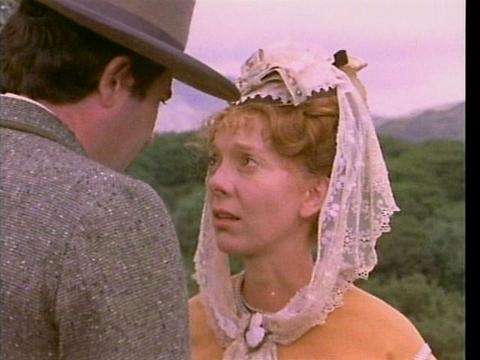
ady Laura (Anna Massey) appealing to Phineas
Lady Laura: “Do you remember when you and I were here last?”
Phineas: “Yes. You told me you were going to marry Mr Kennedy.”
Lady Laura: “Phineas, I have made a terrible mistake. I’ve blundered and I’ve fallen. I’m now so bruised that I can hardly stand.
Phineas: “Is it as bad as that?”
Lady Laura: “It is as bad as it can be. I do not know why I should come crying to you.”
Phineas: “You can come to no one who is more anxious for your happiness.”
It is here that dialogue from the scene in Trollope where Lady Laura tells Phineas he must stay away from her (the sexual temptation is so strong) is brought in; here that he agrees; unlike that scene, Mr Kennedy emerges suddenly (suspense here for they kiss passionately) to interrupt the idyl, and his statement shows him also to remember that day but still in optimistic ways: “I am glad you both love this spot as I do.” There are far more moments of sympathy for Kennedy in the films than in Trollope’s book. Scene 5) Loughlinter, inside the house again: the Pallisers, Phineas, Barrington Erle all bid adieu to Laura and Robert Kennedy. We are made to feel how Laura will now be isolated but also how Kennedy is as yet unaware of how his wife has begun to feel about him: Kennedy is still urging Phineas to come visit them.
Episode 2: “Payment Made.” Scene 6) Madame Max’s apartment in London. She plays her haunting song to Phineas and articulates a main theme of the part, “”Time is pressing us very hard.” Phineas confesses his desire for Violet to her, and how “worrying” it is that he will offend the Brentford clan; she ushers him out to let the Duke in. Scene 7) Phineas’s lodging room. Phineas returns to find Mr Clarkson (Sidney Bromley) in possession; at first he is as gay as Fitzgibbon might counsel:
Phineas: “Good afternoon, Mr Clarkson. Yes. I’m sorry I’m a bit late for tea this afternoon … Oh! what’s the matter with your appetite, Mr Clarkson. Nothing wrong with the muffins, I hope?”
He is soon beat down by Clarkson who has sent for the sheriff as Parliament is breaking up, and Laurence Fitzgibbon has gone underground. This is in the piece as a comic female a high point of comedydea ex machina comes to Phineas’s rescue in the person of Laurence’s unmarried sister, Aspasia Fitzgibbon (Rosalind Knight) who amidst her scorn for weak men (she’s glad she never married) and hardball negotiating shows she at least wants to see her brother play fair. This capital scene is wholly invented by Raven; the first name is Trollope’s: Aspasia was a learned powerful woman, partner to Pericles, and she is often identified with wisdom (as in Judy Chicago’s Dinner Party where she has a place setting).
Finn: “Miss Fitzgibbon, why have you come here?
Miss F: “To sermonize, Mr Finn. I’m an unmarried woman.”
Finn turns away.
Miss F: (sits down with Mr Clarkson, and after pouring tea, reaches into her skirt pockets for something) “Now Mr Clarkson, how much is owing?”
Clarkson: “Um. Ah. Bills for £300”
Miss F: “How much did my brother have for it in money?”
Clarkson: ”£120 … what with other considerations …”
Miss F: Dear me, between your greed, Mr Clarkson, Mr Finn’s credulity, and my brother’s sheer wanton waste, I’m quite appalled. You men! Thank God I never got married. (Fingering bills below the table.) Settle for 200, Mr Clarkson, cash down.”
Clarkson: “250”
Miss F: “220”
Clarkson: “225”
Miss F: “Done.” (Close-ups back and forth.) (She lays money on the table.)
Clarkson: “10, 15, 20, marvelous.It is always been a pleasure to do business with you, ma’am …” (Gets up and walks off.)
Miss F: (Puts out elegantly-gloved hand). “Mr Clarkson!?”
Clarkson: “Oh, the bill ….” (gives it over)
Scene 8) Palliser’s apartment in London. Equally powerful scene juxtaposed to this one of the Pallisers at home. From 3:6 on we have been encouraged to believe that all is well with Lady Glen and Plantagenet and they have found common ground, a modus vivendi and are getting along beautifully for the most part; suddenly in 5:9 we have a re-eruption of the old or more fundamental incompatibility of spirit and outlook between the two. She is delightedly playing on the floor with her young son, telling a fairy tale and physically gobbling at his arm (a sensual gesture), coming down on the floor with him, and bending very low. Palliser is incensed at this to him distasteful scene; he regards it nonsense, a spectacle; were we to psychanalyze he is probably jealous, and he wants to stop her and control her. He pulls the child away and peremptorily orders the nurse to remove it from the room. The boy starts to scream and he says to Lady Glen, “See you’ve upset him.” To this she says “I?” it’s you and “How dare you take my child from me.”
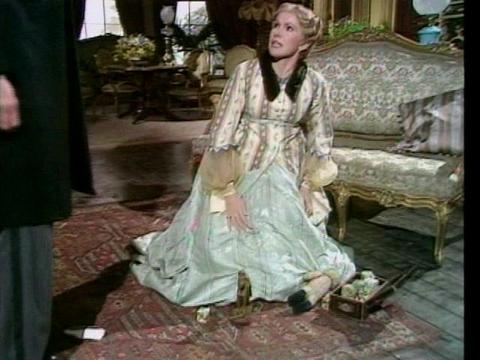
Plantagenet and Lady Glen
She: “How dare you take my child from me?”
But he dares; he’s in charge—just like Robert Kennedy who can forbid his wife to go to London and live with her father; who can remove novels from her hands, force her to listen to him, and sleep in his bed if not have sex with him in the way he wants. So Lady Glen bursts out that she hates being pregnant, a breed cow, and wishes she had not followed “her duty,” for it was that that kept her with Plantagenet, and that he doesn’t love her. The reality is he does in his way, but on terms he understands and he doesn’t understand her, he loves her when she seems to be what he wants her to be. He sits down very hurt, and angry too. And the scene ends on her apologizing to him frantically and he putting his arm on her hand. That arm on her hand is the important difference between their relationship and the Kennedys.
Episode 3: “Laura’s Misery.” Scene 9) Phineas in a railway car heading for Brentford election; a rare use of voice-over in this series: we hear Lady Laura’s voice as Phineas reads her poignant letter whose tone is controlled about her life now; he looks grieved for her; Scene 10) Loughlinter, inside, dark. Scene meant to contrast and compare to Pallisers (just above). Nick Hay analyzed this one for us on Trollope-l:
“It is worth recounting this scene in detail – the lead in is a shot of Phineas in a train reading Laura’s letter to him; Laura’s voice takes the form of a voice-over and is gentle and kind. We then cut to Laura herself at Lochlinter, dressed entirely in black, her yes far-away so we connect her to the letter. Kennedy, also dressed in black enters, and comes and asks if her headache is better – he says she has a headache every morning (I am convinced that Raven is using this ‘headache’ to imply that Laura is denying Kennedy sex). Laura replies in a harsh tone – very different from that in the voice-over that it is not. He talks of his ‘marital rights’. Kennedy rings the bell and a servant enters with breakfast. They fall silent, then, when he has gone, seat themselves opposite one another at the table in this gloomy, dark hall (a sharp contrast to the light elegance of the London abodes of the Pallisers and Madam Max).
The conversation turns to Kennedy’s demand for Laura’s dowry. She asks why he is asking for it; what could he want it for, what could he who has everything want from her. He replies ‘Love.’ He accuses Laura of having taken everything (money, position) from him and having given nothing, so he will have his ‘legal rights’; Laura slumps back unable to respond. This is very interesting because for a moment we see Kennedy sympathetically, we get a view of his internal processes (Trollope does not allow us to see this at all sympathetically; in Trollope Kennedy is a bugbear type straight out of religious fundamental evangelicism which Trollope disliked intensely). And what he says is of course true – Laura has married Kennedy under false pretences. So with hurt male pride he falls back on law and rights and the threat (or actuality?) of rape.
Actually the character Kennedy reminded me of here was Harry Gilmore in Trollope’s The Vicar of Bullhampton: Gilmore is quite ready to marry Mary and ‘use’ her even though he knows she does not love him (Gilmore is worse because he is under no illusions before the marriage).”
Scene 11) Lord Brentford’s apartment in London: Phineas hurries in, successful once again; Violet and Brentford (Lockwood West) congratulate him, but then tell of Lady Laura’s misery (the heading for the episode is apt); Violet becomes upset & hastens out when Lord Brentford seems not willing to acknowledge that Lord Chiltern’s point of view (he will not pay the huge sum Kennedy wants because he hates Kennedy and does not think Laura can be happy until she leaves him) and speaks with disdain of Chiltern’s companion: “I must go to my aunt though I do not supose I shall find much charity there either.” Brentford confides to Phineas he longs for Chiltern to marry Violet; as Violet is very rich, that will solve the money problems, and he likes Violet; Phineas suggests this will never be, and Brentford resents this comment. Scene 12) Phineas’s handsome office in London where he writes a letter to Lord Chiltern telling of his pursuit of Violet. McCann reads the letter aloud to us;
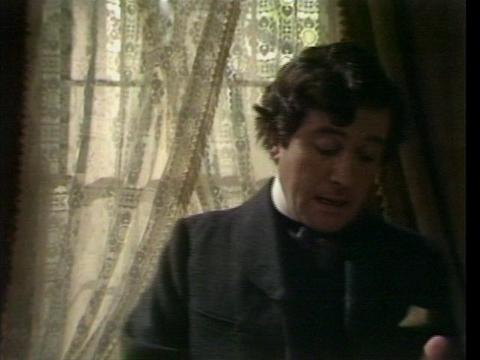
Phineas reading his letter aloud to us (not a voice-over)
Scene 13) Saulsby, a picturesque landscape with Violet, the great prize.
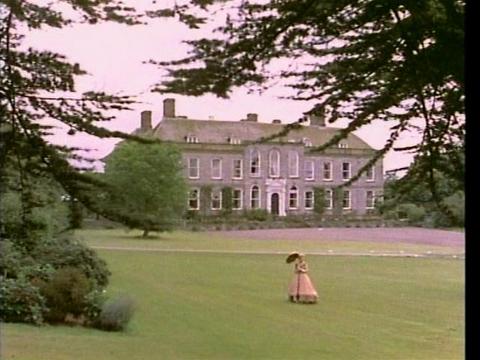
Violet glimpsed in front of great country house, painting-like Arcadian nostalgia
When we first meet Violet Effingham in Trollope’s Phineas Finn, she says she’s a “dear duke of a thing.” But, alas, Raven omits all of Violet’s irony and feminist wit. He apparently can only present women sympathetically from positions of loss or comic power.
Episode 4: “Blessed Again.” Scene 14) Phineas’s lodging rooms. Fitzgibbon (Neil Stacey) comes to apologize; like Madame Max, Fitzgibbon is someone in whom Phineas can confide his pursuit of Violet This parallel is interesting: Madame Max and Fitzgibbon are among those players of life’s game with handicaps; Fitzgibbon’s is he’s a younger son; he’s an interesting character, a facilitator of the world’s amorality (as is Barrington Erle). Unlike Madame Max, he refuses to pretend to believe Phineas’s assertions of his love as a main motive. Scene 15) Palliser’s flat in London; early evening. Plantagenet happy as Lady Glen has just given birth to a son; the Duke comes to congratulate him; is also pleased Lady Glen did it at a more convenient hour. A pleasant touch is Collingwood (Maurice Quick) expresses the staff’s “congratulations” in such a way as to convey they like Lady Glen and they at least were worried for her. The Duke hurries off to Madame Max. The couple has been “blessed again,” and we feel this new birth has brought the couple together again:
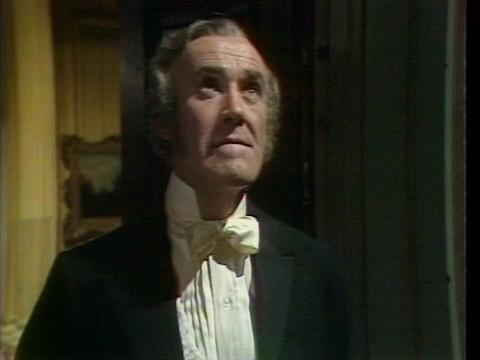
Plantagenet looking upstairs to Glencora’s bedroom
Scene 16) Ireland. A contrast to the picturesque scene between Phineas and Violet; the scene is supposed to suggest an untamed place:
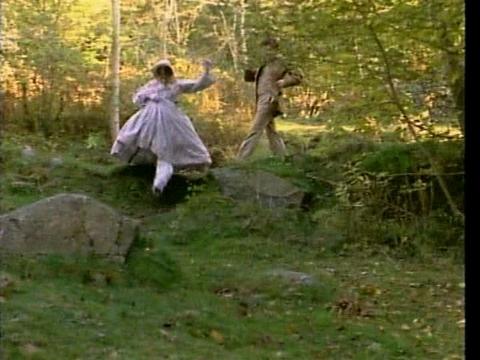
Phineas chasing Mary Flood (Maire Ni Ghrainne) down the vale
Phineas and Mary Flood (Maire Ni Ghrainne) make physical love. She permits it but it is treachery on Phineas’s part. In Trollope’s novel Phineas promises to marry Mary and becomes engaged to her, and thus connects himself honorably but publicly and permanently to her; Mary would lose much face and respect were he to abandon the engagement; in this modern rendition, Phineas has sexual intercourse with her; Raven attempts to present Mary as partly to blame by making her coquettish: “Whatever would the lords and ministers say if they could see you trying to have your wick way with a poor little Irish girl.” She is playing her game too, one to entrap Phineas is Raven’s perspective. The water ending recalls the water pond in the first scene we saw Madame Max and the Duke flirting; the glorious pastoral colors echo scenes with Violet and contrast to the inside staid scenes of Pallisers, sometimes very strain and bleak black grim scenes of Kennedys; contrast to book and husband and wife reading side-by-side clear. Scene 18) Palliser household several months later. A scene of staid married partnership and adjustment contrasts.
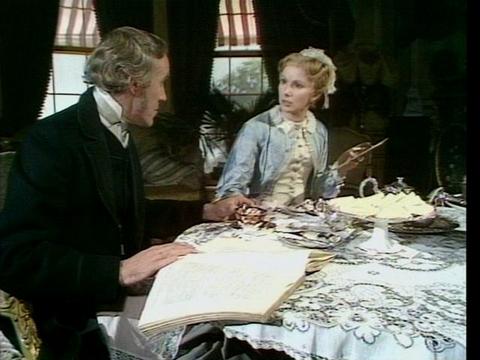
Plantagenet has just said to Lady Glen, isn’t it a little early after Gerald’s birth to start receptions?
Lady Glen intends to resume her receptions this Friday—and to make a friend of Madame Max; she likes Madame Max, sees she’s lonely, but also will this way be better able to maneuvre Madame Max away from marrying the Duke. This breakfast scene should bring us back to breakfast scene in 3:5, Episode 1, Love Declared. Raven and Trollope before him appear really to think pregnancies and babies reconcile married couples to one another.
Episode 5: “At Odds.” Scene 19) Phineas’s Lodging rooms. Slide (Clifford Rose) visits Phineas and threatens to publish a letter which will smear Phineas and Lady Laura unless Phineas agrees to back out of Loughton in the next election so Slide can run and win. We are made to see how Slide cared nothing for the secret ballot as now he is willing to give up pressuring Phineas to support that; Phineas at first laughs at Slide and we see how Phineas thinks he is above Slide:
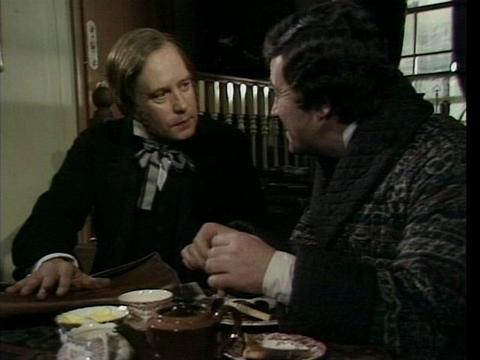
Phineas (the great reformer) laughs at Slide’s idea he can run for “Lord Brentford’s borough
Slide grows angry and insulting; Phineas opens the letter and instantaneously gets up and starts to become violent, calling loudly, “Get out,” and Slide hastens off. Slide is another man total outsider from get-go like Fernand Lopez (the half-Jewish man in The Prime Minister, later played by Stuart Wilson brilliantly) and presented as someone you cannot predict, cannot trust the next moment, who has no morality at all. So too Mr Joseph Emilius (another Jewish man, a little later played by Anthony Ainley—Trollope appears to have been willing to exploit anti-semitism); even Mr Bonteen (Peter Sallis, will appear soon) because he lacks upper class manners in the way Phineas manages on some level not to be trusted (neurotic) while all other “in” people are. George Vavasour (Gary Watson, Parts 2-5) was after all wellmeaning originally and Burgo Fitzgerald (Barry Justice, Parts 1-6) shattered. Scene 20) Downstairs in Bunce (Haydn Jones) lodging house, Slide passes Chiltern on the way up; they collide in their unshared wrath. Scene 21) Phineas’s lodging rooms. Phineas at first welcomes Chiltern as Phineas feels he has acted justly. But Chiltern is violently angry; menacing, will not listen to any reason and demands a duel. In a strong line Phineas calls him a “bully.”
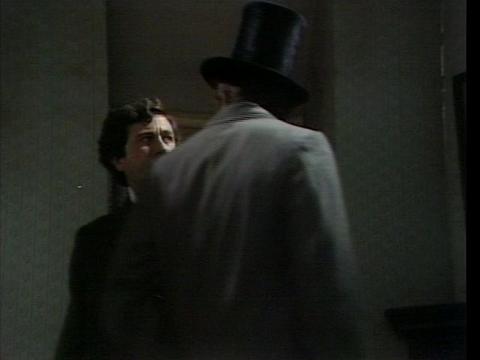
While some of this scene is in Trollope, this line is not, nor the physical menace of the actor; to my mind the scene constitutes an improvement on Trollope’s text. Trollope justifies and is very sympathetic to Chiltern’s behavior throughout.
Scene 22): The Palliser drawing room, another large reception where we meet the characters in Salon concentrates on personal movements of characters again, swirling around Finn again as in 4:7. There is justification for this one from the scene at Hawes where much later in the novel Phineas is in his mind bidding adieu to all; here his life is what’s in danger. Among the pairs and groups, conversations include Lady Glen asking Barrington Erle about Laura: Laura has not been permitted to come to London because she will not observe Sunday in the way Kennedy demands, and Lady Glen asks “when will she be released?” Lady Glen’s arranged marriage for money & security for her (she was coerced by others) is again contrasted to Lady Laura’s arranged one for money and ambition (it was her conscious choice). Lady Glen was lucky in her husband, Lady Laura was not. Violet Effingham is seen, she is attracted to Phineas, and we have just seen why Chiltern could be bad news for her. Kennedy comes along and his meanness of mind is emphasized. We see Lady Glen and Madame Max fall naturally into sympathetic courtesies.
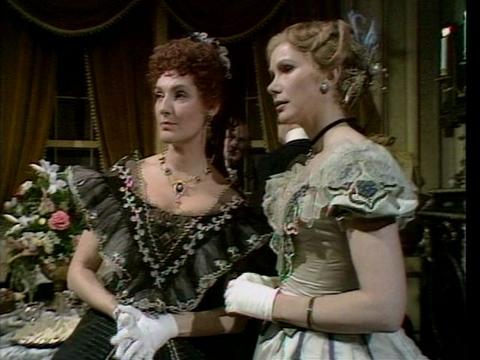
Lady Glen and Madame Max look out at the world as one
As I wrote in “Strained and Broken Relationships”(a thematic summary of this Part), we then have the first real conversation between Palliser and Madame Max too: Madame is the first since Griselda to talk of his schemes for money reform seriously.
Again Madame Max (or Marie as one is tempted to call her when she begins to discuss where she buys her lace with Lady Glen) provides a tonic note of common sense and an attempt to reach others which contrasts to just about everyone else but Phineas Finn himself who however doubledeals. While there is brief political talk for its own sake, as the Part 9 has been, almost all of the scene is about personal relationships.
When Fitzgibbon (Neil Stacy) comes in and takes Phineas away to the duel (perhaps Phineas’ death or a murder he could commit), a closing ominous note is struck. Again the part ends with a bleak or dark note. In the earlier parts Phineas was merely menaced by a debt collector for a bill he didn’t pay, by an unscrupulous newspaper man seeking to pressure him; but now he may pay for his ambitions with his very life. This is made theatrically romantic and yet sordid by the appearance of Dolly Longstaffe (Donald Pickering) at this point.
Dolly has not been seen all part long (he is a choral figure taken by Raven from Trollope’s The Way We Live Now and The Duke’s Children), and when Lady Glen hurries over to him, his sneering salacious tone implies he’s been at a different kind of “assignation” than Phineas is off to.
As in a number of the early parts where Burgo’s deep misery is counterpointed by laughing ironies he himself articulates, so here Phineas’s serious danger is counterpointed by Lady Glen’s titillation at Dolly’s apparent secret knowledge of some thrilling “mystery” he’s not telling.
Dolly: (to Phineas, taken off by Fitzgibbon): “Bon voyage.”
Lady Glen: “Mrs Finn is in rather a rush.”
Dolly: “I think he has an assignation.:
Lady Glen: “Oooh! So that’s the mystery. Don’t tell me he’s got anther romance going?”
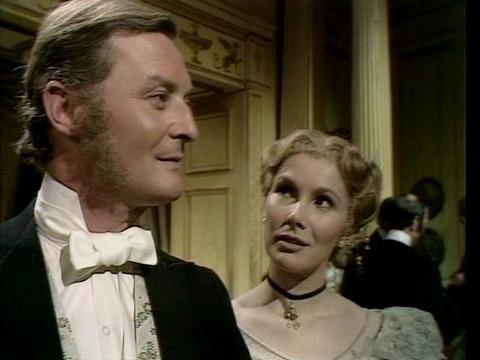
Dolly Longestaffe (Donald Pickering) with Lady Glen (Susan Hampshire) watching Fitzgibbon (Neil Stacy) lead Phineas away
As the anamnesic music begins, and she turns sombre and then quizzical in expression, and Dolly (Raven’s ironic mouthpiece) gets the last word: “It’s romantic enough … in its way.”
Sylvia
--
Posted by: Ellen
* * *
Comment
commenting closed for this article
